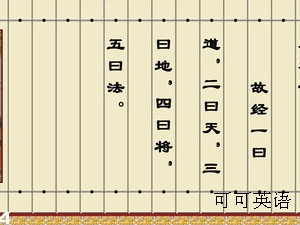始记篇 NO.3:
一曰道,二曰天,三曰地,四曰将,五曰法。
道者,令民于上同意,可与之死,可与之生,而不畏危也。
天者,阴阳、寒暑、时制也。
地者,高下,远近、险易、广狭、死生也。
将者,智、信、仁、勇、严也。
法者,曲制、官道、主用也。
凡此五者,将莫不闻,知之者胜,不知之者不胜。
这句啥意思:
一是道,二是天,三是地,四是将,五是法。
道,指君主和民众目标相同,意志统一,可以同生共死,而不会惧怕危险。
天,指昼夜、阴晴、寒暑、四季更替。
地,指地势的高低,路程的远近,地势的险要、平坦与否,战场的广阔、狭窄,是生地还是死地等地理条件。
将,指将领足智多谋,赏罚有信,对部下真心关爱,勇敢果断,军纪严明。
法,指组织结构,责权划分,人员编制,管理制度,资源保障,物资调配。
对这五个方面,将领都不能不做深刻了解。了解就能胜利,否则就不能胜利。
英文这么说:
These are:The Moral Law; Heaven; Earth; The Commander; Method and discipline.
The Moral Law causes the people to be in complete accord with their ruler, so that they will follow him regardless of their lives, undismayed by any danger.
Heaven signifies night and day, cold and heat,times and seasons.
Earth comprises distances, great and small;danger and security; open ground and narrow passes;the chances of life and death.
The Commander stands for the virtues of wisdom,sincerely, benevolence, courage and strictness.
By method and discipline are to be understood the marshaling of the army in its proper subdivisions, the graduations of rank among the officers, the maintenance of roads by which supplies may reach the army, and the control of military expenditure.
These five heads should be familiar to every general:he who knows them will be victorious; he who knows them not will fail.

关于《道天地将法》
所谓“道”,就是从政治上使民众与君主的思想一致,这样,民众就能与君主同生死共患难,誓死效命,毫无二心;所谓“天”,就是气候的阴晴、寒暑、四季节令的更替规律等;所谓“地”,就是指行程的远近、地势的险峻和或平易,战地的广狭,是死地还是生地等;所谓“将”,就是看将领们是否具备智、信、仁、勇、严五种素质;所谓“法”,就是指部队的组织编制制度,军官的职责范围规定,军需物资的供应管理制度等。












